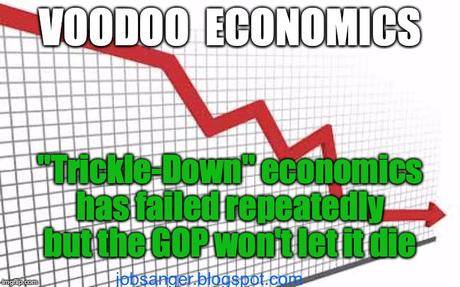
 Republican economic policy has been good for the rich -- but not for anyone else. And it has been horrible for the government and the economy.
Republican economic policy has been good for the rich -- but not for anyone else. And it has been horrible for the government and the economy.Sadly, Trump and the current batch of GOP congressmen refuse to admit failure. They tried again with the tax cut for the rich, which was supposed to be good for the economy and everyone in it. It wasn't. Like in the past, it was just another Republican economic failure -- VooDoo economics.
Here is how economist Paul Krugman describes it in his New York Times column:
Almost four decades ago then-candidate George H.W. Bush used the phrase “voodoo economic policy” to describe Ronald Reagan’s claim that cutting taxes for the rich would pay for itself. He was more prescient than he could have imagined.
For voodoo economics isn’t just a doctrine based on magical thinking. It’s the ultimate policy zombie, a belief that seemingly can’t be killed by evidence. It has failed every time its proponents have tried to put it into practice, but it just keeps shambling along. In fact, at this point it has eaten the brains of every significant figure in the Republican Party. Even Susan Collins, the least right-wing G.O.P. senator (although that isn’t saying much), insisted that the 2017 tax cut would actually reduce the deficit
During the 2016 campaign Donald Trump pretended to be different, claiming that he would actually raise taxes on the rich. Once in office, however, he immediately went full voodoo. In fact, he has taken magical thinking to a new level.
True, whenever tax cuts fail to produce the predicted miracle, their defenders come up with bizarre explanations for their failure.
My favorite until now came from Art Laffer, the original voodoo economist and recent recipient of the PresidentialMedal of Freedom Why did George W. Bush’s tax-cutting presidency end not with a boom, but with the worst economic slump since the Great Depression? According to Laffer, blame rests with Barack Obama, even though the recession began more than a year before Obama took office. You see, according to Laffer, everyone lost confidence upon realizing that Obama might win the 2008 election.
But Trump has gone one better. As it has become increasingly clear that the results of his tax cut were disappointing — recent data revisions have marked down estimates of both G.D.P. and employment growth, to the point where it’s hard to see more than a brief sugar high from $2 trillion in borrowing — Trump has invented ever more creative ways to blame other people. In particular, he’s now claiming that the promised boom hasn’t arrived because his opponents are hexing the economy with bad thoughts: “The Democrats are trying to ‘will’ the Economy to be bad for purposes of the 2020 Election.”
Can opposition politicians really cause a recession with negative thinking? This goes beyond voodoo economics; maybe we should call it evil-eye economics.
To be fair, the claim that Democrats are hexing his boom is a secondary theme in Trump’s ranting. Mostly he has been blaming the Federal Reserve for its “crazy” interest rate hikes. And the truth is that last year’s rate increases pretty clearly were a mistake.
But blaming the Fed for the tax cut’s fizzle won’t wash. For one thing, the Fed has actually raised rates less than in previous economic recoveries. Even more to the point, the Trump economic team was expecting Fed rate hikes when it made its extravagantly optimistic forecasts. Administration projections from a year agoenvisioned 2019 interest rates substantially higher than what we’re actually seeing.
Put it this way: The Trump tax cut was supposed to create a boom so powerful that it would not only withstand modest Fed rate hikes, but actually require such hikes to prevent inflationary overheating. You don’t get to turn around and claim betrayal when the Fed does exactly what you expected it to do.

